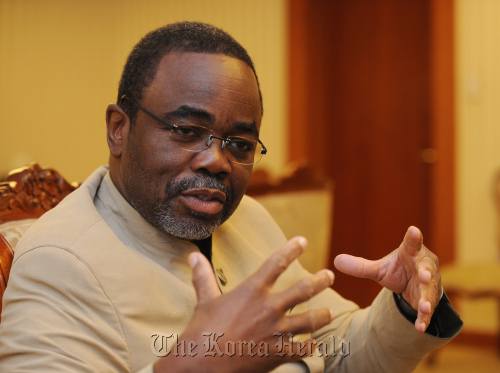The chief of the world’s only legally binding convention combating desertification urged leaders to accelerate efforts to fight degradation and regenerate soil to prevent massive food shortages.
“People take soil for granted. We may survive oil peak but we will never survive soil peak,” Luc Gnacadja, chief of the United Nations Convention to Combat Desertification told The Korea Herald.
 |
Luc Gnacadja, executive secretary of the United Nations Convention to Combat Desertification. (Lee Sang-sub/The Korea Herald) |
The Brown Revolution he referred to calls for public and private sector efforts to make renewable and sustainable use of land to secure the most valuable resource for human beings.
“Unfortunately, we are reaching a tipping point where the vital services provided by the soil, such as food, water and energy have become finite,” the Beninese leader said. He emphasized that more people need to realize degrading of the soil will make land worthless eventually halting crop production. According to the UNCCD, the world is losing 24 billion tons of soil every year due to erosion, dead zones at the mouths of rivers and overgrazing. Land degradation affects 1.5 billion people, according to the UNCCD.
UNCCD is the world’s first and only legally binding convention built to address the problem of desertification.
According to The Global Risks Report 2011 of the World Economic Forum, the demand for water, food and energy is expected to rise by 30 to 50 percent in the next two decades. It predicts a severe shortage of the resources to cause social and political instability, geopolitical conflict and irreparable environmental damage.
Gnacadja is in Korea to attend the Jeju CEO Summer Forum this weekend, a gathering of top executives to discuss the issue.
The chief of the UNCCD said misuse of land in Asia was particularly worrisome as the region was experiencing desertification in China and Mongolia spreading to other parts of the world.
“In Asia, the first problem is fast desertification and then overgrazing. China is losing 12 million hectares of land every year where we could have grown 20 million tons of grain,” he said. The Korean Peninsula is plague by yellow dust from northwest of China and Mongolia. In the last five decades, the number of dust storms increased fivefold and the situation is worsening as wind from Siberia is bringing more of them to Korea.
“We need to bring private sector leaders and policymakers together and make investments in renewable use of the land.” He pointed to the overgrazing of dry land commonly practiced among livestock farmers in Asia where farmers breed animals to the point where soil dries up and becomes wasted permanently.
He urged the private sector to join restoring efforts.
“Private sector can be greater part of solution.
“For example, a Korean company will be able to supply solar power to Ningxia Province in China where clean energy to a seedling nursery growing trees for afforestation can help the local community and minimize the pressure on ground vegetation,” he said.
Gnacadja was appointed as executive secretary of the UNCCD by U.N. Secretary General Ban Ki-moon in 2007.
By Cynthia J. Kim (
cynthiak@heraldcorp.com)








